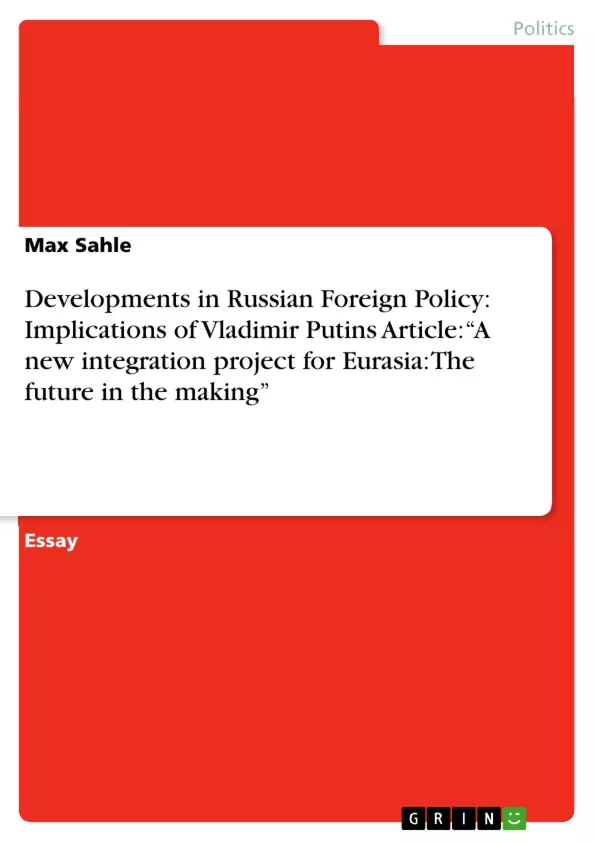This short essay draws some conclusions from Vladimir Putins article:
"A new integration project for Eurasia: The future in the making" published in Oktober 2011.
It takes a look at the following aspects:
- Securing Russia’s sphere of influence
- Image and Approval Ratings
- Stagnation and Reform
Inhaltsverzeichnis (Table of Contents)
- Introduction
- Securing Russia's sphere of influence
- Image and Approval Ratings
- Stagnation and Reform
- Conclusion
Zielsetzung und Themenschwerpunkte (Objectives and Key Themes)
This article by Vladimir Putin examines the creation of the Common Economic Space (CES) and its potential role in shaping Russia's foreign policy. It analyzes the motivations behind this initiative, particularly in relation to Russia's aspirations for regional influence and economic growth. The article sheds light on Russia's strategic goals and the implications of its evolving relationship with the European Union and other global powers.
- Russia's strategic goals for regional integration and economic development
- The implications of the CES and the proposed Eurasian Union for Russia's foreign policy
- The role of the CES in securing Russia's sphere of influence in Eastern Europe and Central Asia
- The impact of the CES on Russia's economic prospects and its relationship with the West
- The influence of domestic political factors on Russia's foreign policy decisions
Zusammenfassung der Kapitel (Chapter Summaries)
The introduction outlines the key elements of Putin's article, including the establishment of the CES, the proposed Eurasian Union, and the article's broader implications for Russia's foreign policy.
The second chapter delves into the CES and the Eurasian Union as attempts by Russia to secure its sphere of influence in Eastern Europe and Central Asia. It explores previous efforts at regional integration, their limitations, and the challenges posed by the European Union's Eastern Partnership Program.
The third chapter examines Putin's article in the context of his approval ratings and the broader political landscape in Russia. It highlights the importance of public opinion and the role of foreign policy in shaping domestic political perceptions.
The fourth chapter explores the CES as a potential solution to Russia's economic challenges while simultaneously addressing concerns about political stagnation. It examines the potential economic benefits of the CES, the role of authoritarianism in its member states, and the implications for Russia's relationship with the West.
Schlüsselwörter (Keywords)
The primary keywords and focus topics of the text include regional integration, foreign policy, Eurasian Union, Common Economic Space, sphere of influence, Eastern Partnership Program, economic development, political stagnation, approval ratings, and domestic politics. The text analyzes the implications of Russia's evolving foreign policy and the role of the CES in shaping Russia's strategic goals. It explores the challenges and opportunities associated with Russia's relationship with the West and examines the interplay between domestic and foreign policy considerations.
Frequently Asked Questions
What is the "Eurasian Union" proposed by Vladimir Putin?
The Eurasian Union is a proposed integration project aimed at creating a closer economic and political bond between Russia and other former Soviet states, building upon the Common Economic Space (CES).
What is the primary goal of the Common Economic Space (CES)?
The CES aims to foster regional economic integration, secure Russia's sphere of influence in Eastern Europe and Central Asia, and provide a counterweight to other global economic powers like the EU.
How does the Eurasian project affect Russia's relationship with the EU?
The project is seen as a strategic response to the EU's Eastern Partnership Program, as Russia seeks to maintain its influence in neighboring countries that the EU is also targeting for closer ties.
Does the article address Russia's domestic political issues?
Yes, the essay analyzes how foreign policy successes and the promise of economic growth through the CES are used to bolster Putin's domestic approval ratings and address concerns about political stagnation.
What are the economic implications of this integration for Russia?
The integration is intended to solve economic challenges by creating a larger market and facilitating trade, although it also raises questions about the role of authoritarianism in member states.
When was Putin's article "A new integration project for Eurasia" published?
The article was published in October 2011, outlining a vision for the future of Russian foreign and economic policy.
- Quote paper
- Max Sahle (Author), 2011, Developments in Russian Foreign Policy: Implications of Vladimir Putins Article: “A new integration project for Eurasia: The future in the making”, Munich, GRIN Verlag, https://www.grin.com/document/184239



